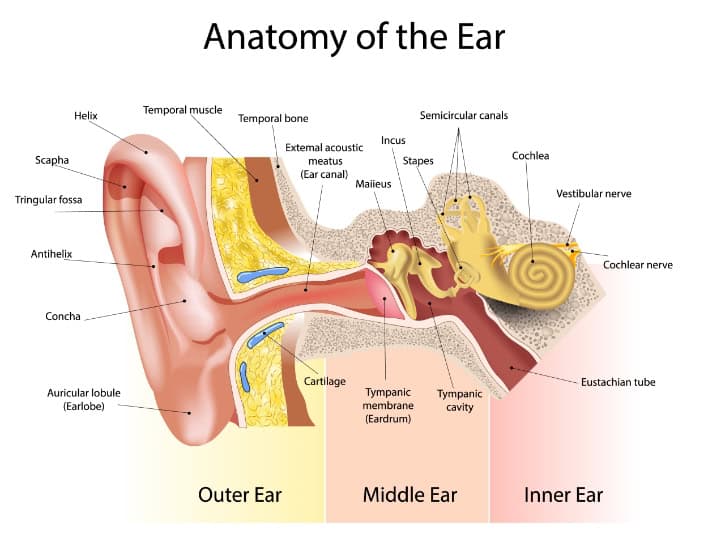HEARING LOSS

Hearing loss is the third most common health problem in the United States, affecting people of all ages. If left untreated, hearing loss can affect your ability to understand speech and can negatively impact your social and emotional well-being, decreasing your overall quality of life.
Prevalence of Hearing Loss in the US
The National Institute on Deafness and Other Communication Disorders (NIDCD), reports the following statistics about hearing loss in the United States:
- One in eight people in the United States (13 percent or 30 million) aged 12 years or older has hearing loss in both ears, based on standard hearing examinations.
- About 2 to 3 out of every 1,000 children in the United States are born with a detectable level of hearing loss in one or both ears.
- Approximately 15% of American adults (37.5 million) aged 18 and over report some trouble hearing.
- Age is the strongest predictor of hearing loss among adults aged 20-69, with the greatest amount of hearing loss in the 60 to 69 age group.
- Men are almost twice as likely as women to have hearing loss among adults aged 20-69.
- Non-Hispanic white adults are more likely than adults in other racial/ethnic groups to have hearing loss; non-Hispanic black adults have the lowest prevalence of hearing loss among adults aged 20-69.
Causes of Hearing Loss
Hearing loss affecting adults is typically associated with aging, but can also be due to hereditary factors, noise exposure (occupational and recreational), viral and bacterial infections, heart conditions or stroke, head injuries, tumors, and certain medications.
Different Degrees of Hearing Loss
Hearing loss is described by varying degrees, not percentages. Hearing loss may be mild, moderate, moderately-severe, severe, or profound, and it can vary across pitches. A person’s hearing deficit is determined by a simple hearing test, where the amount of volume loss you experience is compared to an average of many other adult listeners with normal auditory ability.
The volume, or intensity, of sounds you hear, is measured in decibels (dB), with 0 dB being the softest whisper and 120 dB being a jet engine. The softest sounds a person can hear are called thresholds. Normal hearing thresholds for adults are considered 0 to 25 dB.
Different Types of Hearing Loss
There are four main types of hearing loss: conductive, sensorineural, mixed, and neural.
Conductive Hearing Loss
Conductive hearing loss occurs when there is a problem with the way sound is conducted to the inner ear and a structure called the cochlea. The problem may lie in the ear canal, eardrum (tympanic membrane), or the middle ear (ossicles and Eustachian tube). The inner ear remains unaffected in this type of hearing loss.
Symptoms of Conductive Hearing Loss
Individuals with conductive hearing loss may report the following symptoms:
- Sounds are muffled
- Sounds are very low or quiet
Causes of Conductive Hearing Loss
There are several causes of conductive hearing loss including
- Outer or middle ear infections
- Complete ear wax blockage
- Deterioration of the middle ear bones (ossicles)
- Otosclerosis (fixation of the ossicles)
- Perforated tympanic membrane (TM, a hole in the eardrum)
- Absence of the outer ear or middle ear structures
Conductive hearing loss can be temporary or permanent, depending on the source of the problem. Medical management can correct some cases, while amplification may be a recommended treatment option in long-standing or permanent cases.
Sensorineural Hearing Loss
Sensorineural hearing loss occurs when there is a problem with the sensory receptors of the hearing system, specifically in the cochlea of the inner ear. The majority of cases occur as a result of an abnormality or damage to the hair cells in the cochlea. This abnormality prevents sound from being transmitted to the brain normally, which results in hearing loss.
Symptoms of Sensorineural Hearing Loss
Individuals with sensorineural hearing loss may report the following symptoms:
- Muffled speech
- Ringing in the ears (tinnitus)
- Difficulty hearing in background noise
- Feeling that others do not speak clearly
Causes of Sensorineural Hearing Loss
Congenital. These hair cells have been abnormal since birth, which is considered a congenital condition.
Damage to Hair Cells. A deficit in hearing also occurs when the cells are damaged as a result of genetics, infection, drugs, trauma, or over-exposure to noise (late-onset or acquired).
Presbycusis. Hair cells are damaged as a result of the aging process, which causes a kind of hearing loss known as presbycusis (pres-be-cue-sis).
Sensorineural hearing loss is generally permanent and may stay stable or worsen over time. Routine hearing tests are needed to monitor hearing loss. Amplification is the most common treatment, and it includes hearing aids or cochlear implants in the most severe cases.
Mixed Hearing Loss
Mixed hearing loss occurs when a person has an existing sensorineural hearing loss in combination with conductive hearing loss. This type of hearing deficit is considered a mix of sensorineural and conductive hearing losses, which means there is a problem in the inner ear as well as in the outer and/or middle ear.
The conductive hearing loss may be temporary or permanent, depending on the source of the problem. Mixed hearing loss can sometimes be treated with medical management, and hearing aids are a common treatment recommendation.
Neural Hearing Loss
Neural hearing loss occurs when the auditory nerve that carries impulses from the cochlea to the brain is missing or abnormal. This form of hearing deficit is difficult to diagnose, as the exact location of neural hearing loss is not always evident to audiologists.
To treat neural hearing loss, amplification may be recommended in some cases, depending on the severity of the damage to the hearing nerve. Individuals with neural hearing loss often have difficulty understanding speech, even when it is loud enough, especially in background noise.
Causes of Neural Hearing Loss
Causes of neural hearing loss include the following:
- Genetics
- Acoustic tumors
- In-utero exposure to certain infections
- Severe jaundice in infancy
- Low birth weight associated with premature birth
Ill-Effects of Untreated Hearing Loss
According to Hear Well, Stay Vital, studies suggest that untreated hearing loss can lead to some or all of the following:
- Anger, Fatigue, Stress, and Depression
- Avoidance or Withdrawal from Social Situations
- Loneliness
- Reduced Alertness and Increased Risk to Personal Safety
- Reduced Job Performance and Earning Power
- Diminished Psychological and Overall Health
Social and Emotional Aspects of Hearing Loss
Hearing loss affects overall quality of life and has been shown to negatively impact many areas of our lives.
Hearing loss doesn’t just affect hearing. Hearing is crucial to developing meaningful relationships and the ability to enjoy life, whether it is participating in a conversation between friends or enjoying aesthetic pleasures like music or the rustling of the leaves.
According to research, hearing loss affects overall quality of life and has been shown to impact many areas of one’s life negatively including social, psychological, and cognitive well being. Many adults do not realize how much hearing they have lost, but family and friends may notice changes in behavior.
Those adults whose hearing loss is not treated report:
- sadness and depression
- frustration
- fatigue and tension
- worry and anxiety
- paranoia
- less social activity, withdrawal from group activities
- emotional insecurity
Determine if You Need a Hearing Test
If you think you need a hearing test, take this NIDCD hearing test developed for adults ages 18 to 64. There are 10 quick questions to help you determine if you should have your hearing tested by a hearing healthcare professional.
Seeking Professional Advice
If you suspect you have a hearing loss, you should seek professional advice as soon as possible, because some hearing problems can be quite serious as they may be due to other related illnesses or certain medications.
At Integrated ENT, our audiologists will identify and measure the type and degree of your hearing loss and will recommend treatment options that best fit your needs and lifestyle.
Contact Us
Contact Integrated ENT today for your hearing healthcare needs. We offer on-site hearing tests, hearing aids, and custom hearing protection. For your convenience, you may request an appointment online or give us a call at (303) 706-1616.









